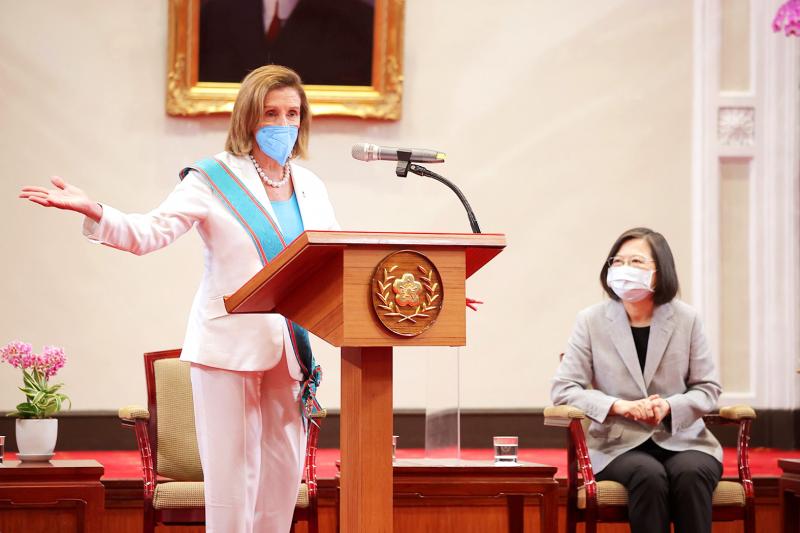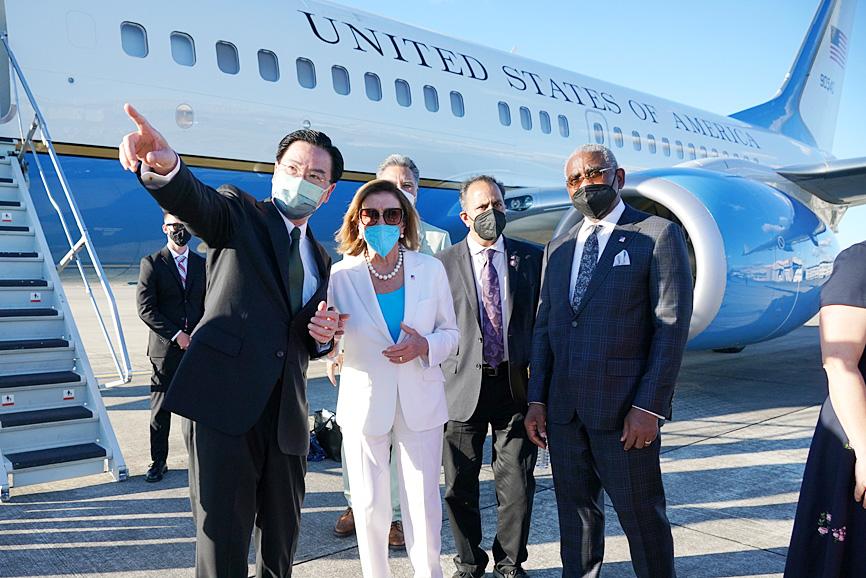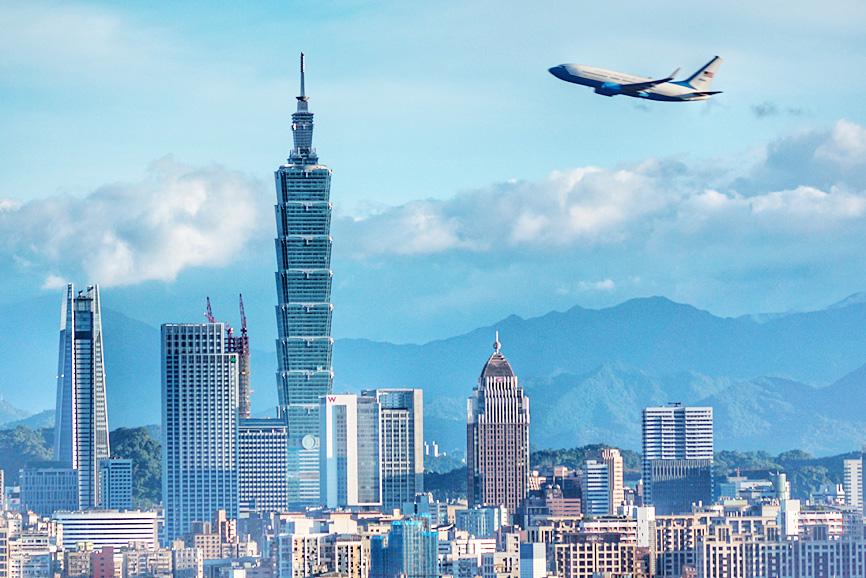US House of Representatives Speaker Nancy Pelosi yesterday said that her delegation traveled to Taipei to make it “unequivocally clear” that the US stands with Taiwan and is proud of the two sides’ enduring friendship.
President Tsai Ing-wen (蔡英文) in the morning received the delegation at the Presidential Office in Taipei, where she awarded Pelosi the Order of Propitious Clouds with Special Grand Cordon in recognition of her long-term support and contributions to the Taiwan-US relationship.
Pelosi said she accepted the award with “great humility” on behalf of the members of the US Congress who are united in their support for Taiwan and looks forward to wearing it on Capitol Hill “as a symbol of our treasured friendship.”

Photo: EPA-EFE / PRESIDENTIAL OFFICE
“Forty-two years ago, America made a bedrock promise to always stand with Taiwan,” she said, referring to the US’ Taiwan Relations Act of 1979.
“On this strong foundation, we have built a thriving partnership grounded in our shared values of self-government and self-determination,” with a focus on mutual security interests and economic ties, she said.
Security, economy and governance are the three main pillars of any US congressional delegation — all areas in which the US and Taiwan enjoy strong cooperation, she said, congratulating Taiwan for being a “model to the world” regarding its success in handling the COVID-19 pandemic.

Photo: EPA-EFE / MINISTRY OF FOREIGN AFFAIRS
Pelosi also called attention to Taiwan’s history of democratization, calling its story “an inspiration to all freedom-loving people.”
“Out of a crucible of challenge you have formed a flourishing democracy, one of the freest in the world, proudly led by a woman president,” she said.
Apart from showing solidarity, the delegation visited to listen to Taiwanese and learn how to participate in the region in a way that allows Taiwan to be successful, she added.

Photo: Lu Chun-wei, Taipei Times
“Now more than ever, America’s solidarity with Taiwan is crucial, and that is the message we are bringing here today,” Pelosi said. “America’s determination to preserve democracy here in Taiwan and around the world remains iron-clad, and we’re grateful for the partnership of the people of Taiwan in this mission.”
Tsai thanked Pelosi for her devoted friendship with Taiwan.
Pelosi previously visited Taiwan in October 1999, showing particular concern over the 921 Earthquake that happened on Sept. 21 just before her visit, Tsai said, assuring the speaker that Taiwan in the decades since has rebuilt and weathered even more challenges.
With Russia invading Ukraine earlier this year, security in the Taiwan Strait has become a global focus with serious implications for the entire Indo-Pacific region, Tsai said.
To cope with these uncertainties, she outlined three key principles:
“First, facing deliberately heightened military threats, Taiwan will not back down,” and will continue to uphold its sovereignty and hold the line of defense for democracy, she said.
She also vowed to do “whatever it takes” to bolster Taiwan’s self-defense capability, making the nation a key stabilizing force for regional security.
“Third, Taiwan is a reliable and trusted cooperative partner of the United States,” she said, pledging to work with Congress and the US administration on security, economic development, talent cultivation and supply chains.
After the meeting, Tsai and Pelosi held a joint news conference for representatives from local and international media, as well as a Japanese representative.
Pelosi said that she and Tsai discussed the three pillars, as well as a trade agreement that “might be possible soon.”
Asked whether Taiwan could expect more visits by high-level US delegations, Pelosi said she “certainly hopes so,” but added that other recent visits by US representatives did not attract the same kind of attention.
Regarding the potential for Tsai or other Taiwanese officials to address the US Congress, Pelosi said that they have not held a joint session for about three years due to the COVID-19 pandemic and other factors.
Regarding the possibility of a response by Beijing, she said: “I think that whatever China is going to do, they will do in their own good time. What excuse they might use to do it is another thing.”
“I do think it’s really important for the message to be clear that in the US House and Senate, Democrats and Republicans are committed to the security of Taiwan in order to have Taiwan most effectively defend themselves,” she said.
To counter China, “we have to show the world the success of the people of Taiwan,” Pelosi said. “Their courage to change their own country to become more democratic, their respect for people is, quite frankly, a model in this region, but we’re not here to talk about mainland China. We’re here to talk about Taiwan.”
Pelosi’s Taiwan visit was the first of a sitting US House speaker since 1997, when Republican Newt Gingrich traveled to Taipei and met with then-president Lee Teng-hui (李登輝).
The other members of Pelosi’s delegation are House Foreign Affairs Committee Chairman Gregory Meeks, House Veterans Affairs Committee Chairman Mark Takano, House Ways and Means Committee Vice Chair Suzan DelBene, House Economic and Consumer Policy Subcommittee Chairman Raja Krishnamoorthi and US Representative Andy Kim.
Pelosi arrived in Taipei at 10:43pm on Tuesday for the third leg of her Asia tour.
During her 19-hour stay, Pelosi also visited the legislature, the Jingmei White Terror Memorial Park in New Taipei City and attended a noon banquet at the Taipei Guest House attended by businesspeople and national security officials, including Taiwan Semiconductor Manufacturing Co (台積電) founder Morris Chang (張忠謀).
Her aircraft departed from Taipei International Airport (Songshan airport) at 6:01pm yesterday to continue the rest of her Indo-Pacific trip, which was to take her to South Korea and Japan before heading back to the US.
Additional reporting by Lu Yi-hsuan and CNA

A Chinese freighter that allegedly snapped an undersea cable linking Taiwan proper to Penghu County is suspected of being owned by a Chinese state-run company and had docked at the ports of Kaohsiung and Keelung for three months using different names. On Tuesday last week, the Togo-flagged freighter Hong Tai 58 (宏泰58號) and its Chinese crew were detained after the Taipei-Penghu No. 3 submarine cable was severed. When the Coast Guard Administration (CGA) first attempted to detain the ship on grounds of possible sabotage, its crew said the ship’s name was Hong Tai 168, although the Automatic Identification System (AIS)

An Akizuki-class destroyer last month made the first-ever solo transit of a Japan Maritime Self-Defense Force ship through the Taiwan Strait, Japanese government officials with knowledge of the matter said yesterday. The JS Akizuki carried out a north-to-south transit through the Taiwan Strait on Feb. 5 as it sailed to the South China Sea to participate in a joint exercise with US, Australian and Philippine forces that day. The Japanese destroyer JS Sazanami in September last year made the Japan Maritime Self-Defense Force’s first-ever transit through the Taiwan Strait, but it was joined by vessels from New Zealand and Australia,

SECURITY: The purpose for giving Hong Kong and Macau residents more lenient paths to permanent residency no longer applies due to China’s policies, a source said The government is considering removing an optional path to citizenship for residents from Hong Kong and Macau, and lengthening the terms for permanent residence eligibility, a source said yesterday. In a bid to prevent the Chinese Communist Party (CCP) from infiltrating Taiwan through immigration from Hong Kong and Macau, the government could amend immigration laws for residents of the territories who currently receive preferential treatment, an official familiar with the matter speaking on condition of anonymity said. The move was part of “national security-related legislative reform,” they added. Under the amendments, arrivals from the Chinese territories would have to reside in Taiwan for

CRITICAL MOVE: TSMC’s plan to invest another US$100 billion in US chipmaking would boost Taiwan’s competitive edge in the global market, the premier said The government would ensure that the most advanced chipmaking technology stays in Taiwan while assisting Taiwan Semiconductor Manufacturing Co (TSMC, 台積電) in investing overseas, the Presidential Office said yesterday. The statement follows a joint announcement by the world’s largest contract chipmaker and US President Donald Trump on Monday that TSMC would invest an additional US$100 billion over the next four years to expand its semiconductor manufacturing operations in the US, which would include construction of three new chip fabrication plants, two advanced packaging facilities, and a research and development center. The government knew about the deal in advance and would assist, Presidential